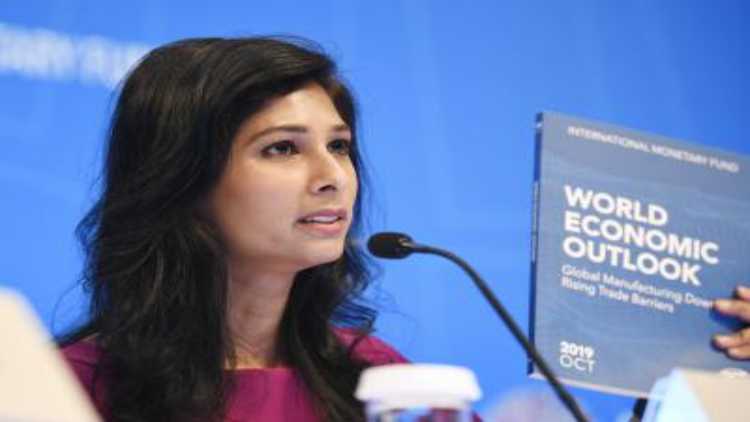
India will be fastest growing economy in 2022
New Delhi
India's economy is projected to grow at the historically high level of 12.5 per cent this fiscal year, as per the latest projection of the International Monetary Fund (IMF).
The projections place India on the top of the list of economies that will recover from the shock of the Corona pandemic in the current and the next year.
According to the IMF data, India will become the world’s fastest-growing economy in 2021 with 12.5 per cent growth. China will be the second-best with 8.4. The trend will continue for 2022 with India recording 6.9 and China 5.6 per cent growth respectively.
India's projected growth rate is 4.1 per cent higher than that for China, which ranks next with 8.4 per cent.
However, while looking at India and Chine it must be kept in mind that China was the only major economy to have a positive growth of 2.3 per cent last year, while the rest of the world was in the red.
India’s economic growth in 2020 plummeted to -8.
Spain was the worst-hit country with its economy plunging to -11 per cent growth rates.
Geeta Vishwanathan’s article “Managing diverse economies’ on IMF’s blog write on the fresh projections of the recovery of the world economies from the pandemic due to positive sentiment generated by the administration of vaccines against Coronavirus in many countries.
According to the latest figures in IMF's World Economic Outlook, the global economy will recover even faster at6 per cent in 2021and 4.4 per cent in 2022.
The cumulative economy of the world had plunged to an estimated historic contraction of -3.3 per cent in 2020.
However, Vishwanathan warns of the continuing challenges from the pandemic to the world economy. In her article, she says the recovery from the pandemic will create more gap between the living standards in the rich and the poor countries and also a growing gap in the incomes of the poor and rich within countries thus negating the gains made in poverty reduction.
The growth projection was raised on the basis of "evidence we were getting in the last couple of months in terms of the normalisation of economic activity," she said at the release of the World Economic Outlook (WEO) report on Tuesday in Washington.
"These numbers precede the current wave of the virus, which is quite concerning," she added.
Former diplomat Syed Akbarudin posted the IMF projections on Twitter and he said," For India...better things ahead in 2021-22)
For India...
— Syed Akbaruddin (@AkbaruddinIndia) April 6, 2021
Far better things ahead in 2021-22...🙏🏽 pic.twitter.com/iX9nLxbRoI
With the unprecedented growth rate projection of 12.5 per cent not seen in modern times, India also regains its status as the world's fastest-growing economy, according to the WEO.
Malhar Nabar, the Division Chief in IMF's Research Department, said, "The current forecast that we have already takes a fairly conservative view on the sequential growth for the Indian economy for this year."
"But it's true that with this very worrying uptick in (COVID-19) cases that pose very severe downside risks to the growth outlook for the economy," he added.
The WEO projected India's gross domestic product (GDP) growth to moderate to 6.9 per cent in next fiscal year, while still retaining the top growth rate spot.
Any elation over the historically high rate is, however, moderated by the fact of India's negative growth rate of 8 per cent during 2020-21.
The growth rate projection for 2021-22 is 1 per cent higher than the 11.5 per cent projection made by the IMF in January and 5.1 per cent more than the 7.4 per cent in April last year.
The previous highest GDP growth rate in modern times for India was recorded in 2010 at 10.3 per cent and the records before that was 9.8 per cent set in 2007 and 9.6 in 1988, according to IMF data.
The IMF growth rate projection for India is nearly in line with the 12.6 per cent from the Organization for Economic Cooperation and Development (OECD) last month.
Gopinath struck a note of optimism for the world economy, which was projected by the IMF to grow by 6 per cent this year, an increase of 0.5 per cent from the January figure.
She wrote in a foreword to the WEO, "Even with high uncertainty about the path of the pandemic, a way out of this health and economic crisis is increasingly visible."
"Adaptation to pandemic life has enabled the global economy to do well despite subdued overall mobility, leading to a stronger-than-anticipated rebound, on average, across regions," she added.
However, she also warned, "A high degree of uncertainty surrounds these projections, with many possible downside and upside risks. Much still depends on the race between the virus and vaccines. Greater progress with vaccinations can uplift the forecast, while new virus variants that evade vaccines can lead to a sharp downgrade."
